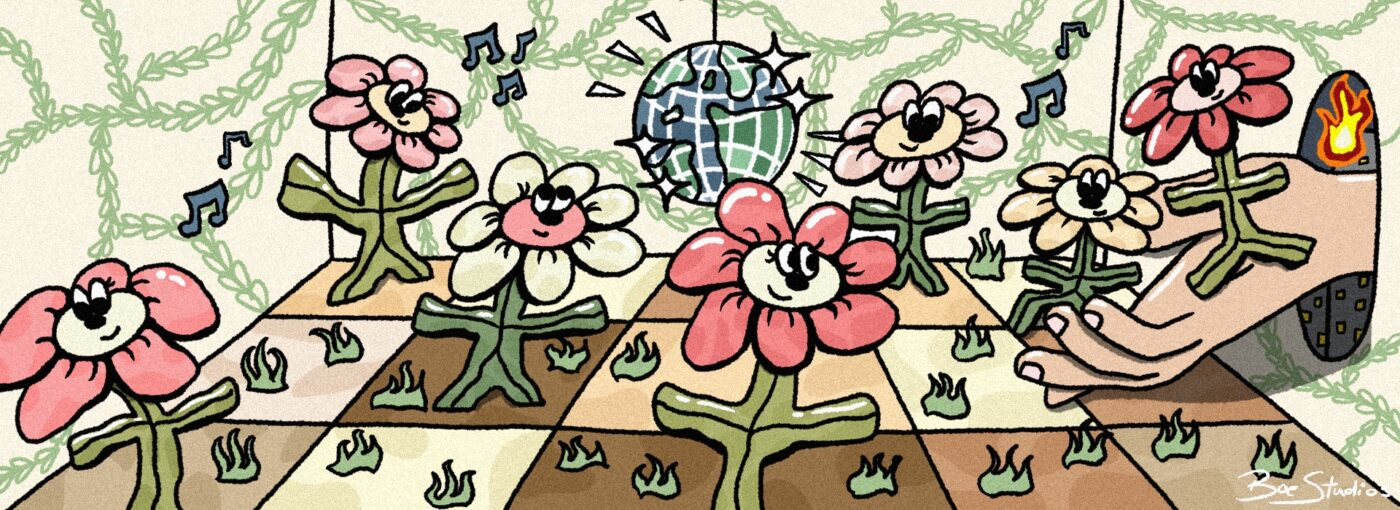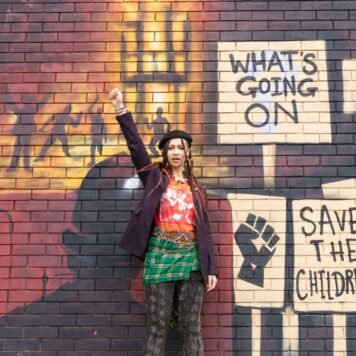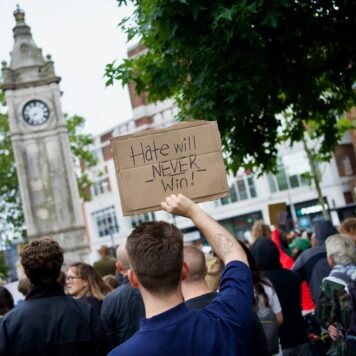Experiencing live music is an act of joy, and sometimes even resistance. In the face of climate breakdown, many of us are trying to live as sustainably as possible, but there is no getting around the fact that clubs and festivals require tonnes of energy to run – from diesel generators needed to power stage equipment such as speakers, to the lights and cooling systems needed all night in music venues.
Acknowledging this does not mean putting a downer on the idea of enjoying nightlife or live music. On the contrary, this realisation means we can seek a way to correct it – a chance to green the entire music industry.
Sustainable boogeying
Many climate-friendly clubbing initiatives have already hit the ground running. In 2021, Glasgow venue SWG3 installed the BODYHEAT energy system, produced by renewable energy firm TownRock. This system allows the heat generated by dancers inside the club to be piped to bore holes underground. There, the heat is stored, acting like a thermal battery, until it can be recycled back into the venue – for both cooling and heating purposes as needed.
Introduced as a trial during COP26 in 2021, the energy system has since become a permanent feature of the large venue – now, significant parts of its power usage come solely from the body heat of its attendees. The owners claim this has eliminated the need for gas boilers of any kind, drastically reducing the club’s carbon footprint and pushing them towards net-zero targets.
The concept of the sustainable dance floor – which means the harder you dance, the more energy you create – had already been innovated by Daan Roosegaarde and trialled by Dutch company Energy Floors with Club Watt in Rotterdam, Netherlands, which styled itself as the world’s first sustainable club back in 2008. It claimed this moniker not only due to its own energy-generating dance-floor – enough to power the venue’s lights and DJ booth – but other green features such as a rainwater flush toilet system and zero-waste bar with drinks served in recycled plastic glasses.
The sustainable dance concept behind Club Watt was an idea to recruit clubbers as the “foot soldiers of a new sustainability movement that combines youth culture with a commitment to sustainable living.” Knowing how widespread environmental awareness among young people now is, it sounds somewhat visionary for its time.
Since then, there has been a more general trend towards sustainability in the nightlife industry. The move towards environmental awareness is positive but it has been a somewhat meandering path. Ideas to sustainify nightlife ranged from the simple – ditching single-use items such as plastic straws – to hugely complex overhauls of whole energy systems and packaging/distribution systems.
There are prime, more recent examples of venues pushing their green credentials to further meet the urgency of the climate challenge before us. Clubs in techno-capital Berlin are being advised by the city’s Senate on how to become emission-free as part of a larger citywide initiative. Notably, festivals such as DGTL have pledged to the Dutch government to become fully circular by 2025. But are these efforts enough to change the outlook of a whole industry?
Greening the entire industry
It is not just venues which are stepping up in recent times; this environmental surge is taking place in the music business more widely. Bioplastic vinyls have been produced for the first time, Bye Bye Plastic is working with artists and organisers to eliminate single-use plastics across the industry, and collectives such as DJs for Climate Action (DJs4CA) and Music Declares Emergency formed to push for a more environment-centred music culture.
I spoke to DJ Lola Villa from DJs4CA about what their collective is doing to help make climate-conscious gigs and music production a reality.
“Originally when Eli Goldstein (of Soul Clap) and Sammy Bananas started the collective in New York in 2011, it was based on noticing the amount of travel DJs have to do. The revenue model for music had become focused on touring, since everyone was streaming music on the internet instead of buying records. The DJ community was not coming together then to find solutions, there was only this shame on the reliance on so much travel to make it in the industry.”
Climate consciousness is an issue still not fully tackled within music, but encouraging realisation of DJs’ carbon footprint has been the first step. The next is to become more efficient in organisation and execution of global tours, such as grouping geographically close locations in succession, and taking trains where possible instead of flights.
Since its formation, DJs4CA have worked to put climate change awareness and sustainability at the forefront of the music scene. This includes community calls for artists or those in the industry to start climate conversations where they are. Handing out resource packs on sustainability whilst touring can assist in educating organisers and fans alike, and has been proven to do so, for example at prominent festival ADE in Amsterdam.
“It was about opening up the conversation about what it means to be a DJ right now, without pointing fingers,” continues Lola.
Nature as creativity
DJs4CA projects have also included events such as Earth Night, an annual international celebration aimed to generate climate action in the electronic music industry. Taking place the weekend after Earth Day, it is meant to function as the nightlife equivalent – multiple spaces to dance together to celebrate nature but also acknowledge the challenge ahead and discuss the vital changes needed to shift the industry to a greener existence.
“Earth Night functions by nurturing local communities around the world,” adds Lola. “It is a creative project to become aware of our connection to Earth and using that to change, whilst becoming more interconnected to each other in our profession.”
Some of the localised celebrations during Earth Night used climate-friendly technology, such as a solar-powered sound systems in Paris venue La Station E. Solar and bicycle-powered speakers are a great example of reliable, renewable use of smart technology as antidotes to finite energy reliance – and their use in raves and festivals is on the rise in Europe and further afield.
Emphasising our connection to nature is a vital step in making the music industry as climate-conscious as possible. DJs4CA have also tackled this by creating The Climate Soundtrack compilation album. This came out of establishing the Climate Sample Pack, a collection of field recordings gathered by Greenpeace from diverse spots around the world – from penguins in Antarctica to haunting whalesong, from the sound of monsoons to the rustling and buzzing of the Papua New Guinea rainforests.
The collective put out a call for international producers and vocalists to use the samples of nature in original tracks, with the theme “What does the future sound like?” – the result being a rich variety of nature-inspired tracks for the compilation album. The final vinyl record was released and sustainably packaged, being produced by Green Vinyl Records using injection moulding instead of a pressing and PVC-free material, without compromising on sound quality.
Size and space
Making use of established communities and co-operating on a local level is key to enacting international change without the reliance on huge in-person forums. But due to the sheer nature of live music gatherings, and especially festivals, size is a monumental issue.
Subscribe to shado's weekly newsletter
Exclusive event news, job and creative opportunities, first access to tickets and – just in case you missed them – our picks of the week, from inside shado and out.

Smaller music festivals have shown a model of organisation which drastically reduces waste and energy consumption, without sacrificing positive vibes, is possible. Festivals run by groups such as Coop Audio, a soundsystem collective based in Bristol and London, have the option to better plan spaces and food to minimise waste.
I spoke to Chris Knutsen of Coop about how their weekender festival, which ran for the third time this summer, tried to keep the experience as sustainable as possible.
“From the start, there was acknowledgement of the fact that we are putting an event in the middle of a climate emergency, so making it as sustainable as possible was a priority for us,” he tells me. “One of our core workstreams was the Eco-workstream, which we quickly realised would interact with all the other parts of organising the weekender – essentially running as eco-advice for the whole operation.”
Food is everything
Practical and non-wasteful food usage was a core strategy to make Coop as sustainable as possible, which is key considering there is an estimated 400 tonnes of food waste produced by UK festivals each year, equivalent to a staggering one million wasted meals. Due to having a working kitchen on-site, the whole ethos of the festival precluded the need for attendees to bring any cash or extra snacks, as all meals were included with ticket price.
Each participant was also a volunteer, and the kitchen worked on a rota system – communal cooking and cleaning aspects were as essential as the dancefloor in terms of social and bonding experiences of the weekend. The less food produced by external, competing sources such as different foodtrucks, the more the waste is controllable and manageable.
As well as keeping single-use to a minimum and sourcing food locally from eco-friendly businesses, the organisers made a decision to go meat-free, not just as a form of carbon offsetting but also in a way to largely accommodate all diets, reducing the need for overcooking multiple options, with meals mainly being one-pot and logistically simple. All food leftovers were offered to patrons to take home after the festival, and many spare dried goods such as tins and pasta were taken to local food banks once organisers returned to London.
This kind of initiative was successful but did not come easily. It required detailed planning for producing the right amount of food, and a reliance on people turning up to their voluntary shifts to help cook the food and tidy afterwards. This speaks to how core it was that attendees were all of the same cooperative, collaborative mindset. It also fed into the festival being small – 180 people – and not run with any profit motive.
“The fact that we ran the event at cost, without an explicit commercial aim behind it, makes it easier to run it in the ethos of sustainability,” explains Chris. “The participatory element related to no money on site, no profit being made – otherwise, it unfortunately tends to become the priority.”
The spectre of greenwashing
Amongst all the seemingly noble initiatives to help live music face and adapt to the climate crisis, there is a danger of (mostly larger) venues greenwashing their environmental credentials. Organisers may cynically use environmental language or boast of climate initiatives to simply appeal to and appease the younger audiences who attend their events; those who, as a generation, have the most concern for the planet.
Such initiatives may turn out to be more of a PR exercise than an actual transformative vision. Making a festival ‘seem’ green or enacting small, superficial changes but marketing them as hugely consequential can have the effect of treating the problem like it is already solved, rather than encouraging widescale mindset shifts which are desperately needed.
The dangers of huge companies exaggerating their green credentials for good PR should not be underestimated in an industry worth up to $31 billion. The contrast between lip service and real concrete action needs to be apparent to us as activists and festival-goers alike.
In even more dire cases of greenwashing, festivals may simultaneously have decent environmental practices but offload this goodwill with disproportionately damaging stunts. For example, the huge Belgian festival Tomorrowland have admirably promoted recycling measures and partnered with a circular water company, but have also been criticised for joining forces with Brussels Airlines to promote exclusive luxury ‘party flights’ to the festival, complete with lavish live DJ sets from the air.
Further, it is an undeniable challenge to enact grassroots changes in an industry where independent festivals are often swallowed up by huge corporations. One of the largest independent UK festivals, Boomtown, was recently part-acquired by American company Live Nation, who already own others such as Isle of Wight Festival and Parklife, as well as the seller Ticketmaster which is notorious for price-gouging practices. Independent organisers being squeezed out by companies creating monopolies within the industry does not ensure a decent environment to radically shift to more widespread eco-friendly practices. Part of greening clubs and festivals means also fighting against the rampant corporatism at the heart of our system.
The road ahead
It is also true that because of the cost of green initiatives, public intervention and huge cultural shifts are needed to subsidise nightlife to not only be successful and safe, but sustainable as a practice, as the effects of climate breakdown become more apparent. It is not as simple as venues managing waste better; climate-conscious clubbing requires innovative and circular solutions, harnessing the energy of crowds and music appreciation to self-sustain what we all love and want to continue.
Chris feels positive that, though the Coop example applies to an admittedly small festival, their efforts have shown alternative models of organising and executing parties are entirely possible.
“I’m quite hopeful that festivals can be better run in terms of environmental impact. It is possible for larger festivals, though difficult. The basic idea of leaving no trace – encouraging people to act in a way which respects the site and is thoughtful about waste – can apply anywhere. Festivals can try to encourage bottom-up behaviour changes from its attendees – with clear principles and collective enforcement of them.”
The number of music collectives, available green technology and education around the issue of climate awareness in the music business is only increasing, but we still have a long way to go to make an industry reliant on international travel and events truly sustainable. We need DJs, artists and organisers, but also the club owners, music promoters and agents, those who hold the most sway and power in the industry, to step up and make this a priority for the international scene. Music has the ear of the masses, and the artistic capabilities to be at the forefront of a cultural shift to permanent climate action. We can’t let up.
As Lola says: “It is hard to measure how far we have spread awareness and how much is left to go, but the representation of people at the intersection of climate and social justice is growing, which can only be a good thing for making the music industry more sustainable too.”
What can you do?
- Explore Atmos magazine which is centred around climate and culture
- Check out the Climate Soundtrack or download the Climate Sample Pack yourself to create a nature-inspired track of your own
- Look out for the next Earth Night or help set up a party in your corner of the world using the Earth Night toolkit
- Read about more initiatives to improve sustainability in the live music industry from A Greener Festival and Clean Scene
- Encourage any festivals or events you attend to make use of reusable cup systems, such as the ones offered by Ecodisco
- Sign Music Declares Emergency’s declaration of the climate and ecological emergency
- Generate some energy by cutting some shapes of your own at SWG3 in Glasgow
- Read Stuart Swift’s Stamp the Wax article Reflections: The Environmental Footprint of Touring DJs and Club Culture
- Consider attending smaller eco-festivals such as Basket of Light
Explore other nightlife movements covered by shado:












